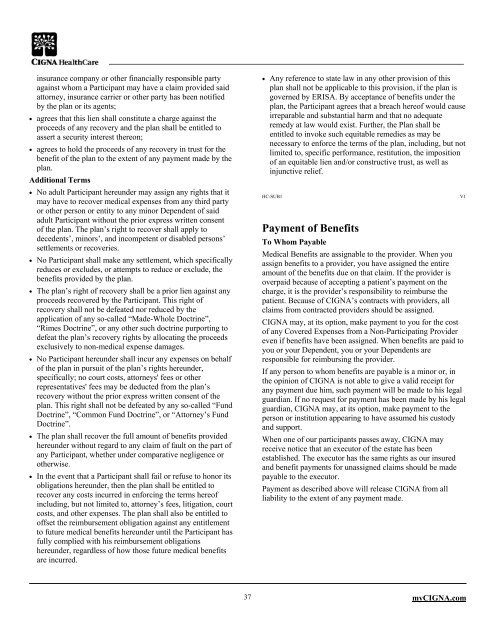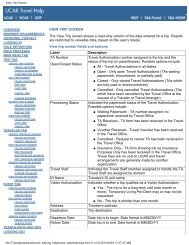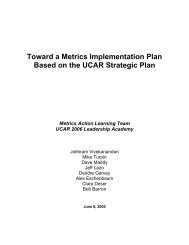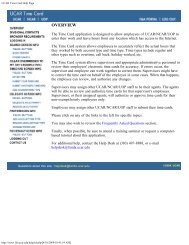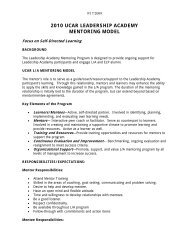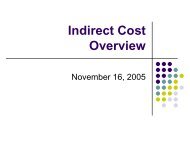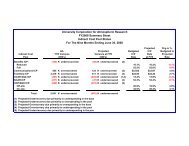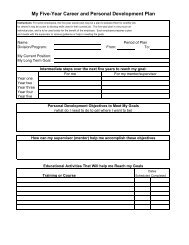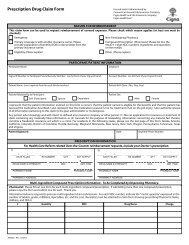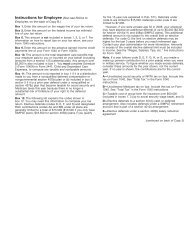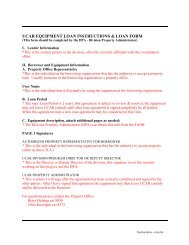CIGNA High Deductible Health Plan (HDHP) - UCAR Finance ...
CIGNA High Deductible Health Plan (HDHP) - UCAR Finance ...
CIGNA High Deductible Health Plan (HDHP) - UCAR Finance ...
Create successful ePaper yourself
Turn your PDF publications into a flip-book with our unique Google optimized e-Paper software.
insurance company or other financially responsible party<br />
against whom a Participant may have a claim provided said<br />
attorney, insurance carrier or other party has been notified<br />
by the plan or its agents;<br />
• agrees that this lien shall constitute a charge against the<br />
proceeds of any recovery and the plan shall be entitled to<br />
assert a security interest thereon;<br />
• agrees to hold the proceeds of any recovery in trust for the<br />
benefit of the plan to the extent of any payment made by the<br />
plan.<br />
Additional Terms<br />
• No adult Participant hereunder may assign any rights that it<br />
may have to recover medical expenses from any third party<br />
or other person or entity to any minor Dependent of said<br />
adult Participant without the prior express written consent<br />
of the plan. The plan’s right to recover shall apply to<br />
decedents’, minors’, and incompetent or disabled persons’<br />
settlements or recoveries.<br />
• No Participant shall make any settlement, which specifically<br />
reduces or excludes, or attempts to reduce or exclude, the<br />
benefits provided by the plan.<br />
• The plan’s right of recovery shall be a prior lien against any<br />
proceeds recovered by the Participant. This right of<br />
recovery shall not be defeated nor reduced by the<br />
application of any so-called “Made-Whole Doctrine”,<br />
“Rimes Doctrine”, or any other such doctrine purporting to<br />
defeat the plan’s recovery rights by allocating the proceeds<br />
exclusively to non-medical expense damages.<br />
• No Participant hereunder shall incur any expenses on behalf<br />
of the plan in pursuit of the plan’s rights hereunder,<br />
specifically; no court costs, attorneys' fees or other<br />
representatives' fees may be deducted from the plan’s<br />
recovery without the prior express written consent of the<br />
plan. This right shall not be defeated by any so-called “Fund<br />
Doctrine”, “Common Fund Doctrine”, or “Attorney’s Fund<br />
Doctrine”.<br />
• The plan shall recover the full amount of benefits provided<br />
hereunder without regard to any claim of fault on the part of<br />
any Participant, whether under comparative negligence or<br />
otherwise.<br />
• In the event that a Participant shall fail or refuse to honor its<br />
obligations hereunder, then the plan shall be entitled to<br />
recover any costs incurred in enforcing the terms hereof<br />
including, but not limited to, attorney’s fees, litigation, court<br />
costs, and other expenses. The plan shall also be entitled to<br />
offset the reimbursement obligation against any entitlement<br />
to future medical benefits hereunder until the Participant has<br />
fully complied with his reimbursement obligations<br />
hereunder, regardless of how those future medical benefits<br />
are incurred.<br />
• Any reference to state law in any other provision of this<br />
plan shall not be applicable to this provision, if the plan is<br />
governed by ERISA. By acceptance of benefits under the<br />
plan, the Participant agrees that a breach hereof would cause<br />
irreparable and substantial harm and that no adequate<br />
remedy at law would exist. Further, the <strong>Plan</strong> shall be<br />
entitled to invoke such equitable remedies as may be<br />
necessary to enforce the terms of the plan, including, but not<br />
limited to, specific performance, restitution, the imposition<br />
of an equitable lien and/or constructive trust, as well as<br />
injunctive relief.<br />
HC-SUB1<br />
Payment of Benefits<br />
To Whom Payable<br />
Medical Benefits are assignable to the provider. When you<br />
assign benefits to a provider, you have assigned the entire<br />
amount of the benefits due on that claim. If the provider is<br />
overpaid because of accepting a patient’s payment on the<br />
charge, it is the provider’s responsibility to reimburse the<br />
patient. Because of <strong>CIGNA</strong>’s contracts with providers, all<br />
claims from contracted providers should be assigned.<br />
<strong>CIGNA</strong> may, at its option, make payment to you for the cost<br />
of any Covered Expenses from a Non-Participating Provider<br />
even if benefits have been assigned. When benefits are paid to<br />
you or your Dependent, you or your Dependents are<br />
responsible for reimbursing the provider.<br />
If any person to whom benefits are payable is a minor or, in<br />
the opinion of <strong>CIGNA</strong> is not able to give a valid receipt for<br />
any payment due him, such payment will be made to his legal<br />
guardian. If no request for payment has been made by his legal<br />
guardian, <strong>CIGNA</strong> may, at its option, make payment to the<br />
person or institution appearing to have assumed his custody<br />
and support.<br />
When one of our participants passes away, <strong>CIGNA</strong> may<br />
receive notice that an executor of the estate has been<br />
established. The executor has the same rights as our insured<br />
and benefit payments for unassigned claims should be made<br />
payable to the executor.<br />
Payment as described above will release <strong>CIGNA</strong> from all<br />
liability to the extent of any payment made.<br />
V1<br />
37<br />
my<strong>CIGNA</strong>.com


